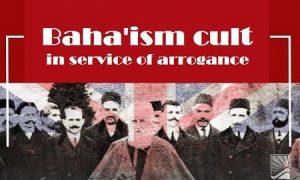(During his lifetime) Abdul Baha asked the Baha’is to be impartial if revolutions or political transformation happened in Iran. He asked the Baha’is not to participate in any sedition, but when we glance at the short history of Baha’ism, we will see nothing but intervention of Baha’ism and its betrayal and hypocrisy. The Baha’is hasn’t been silent nor stepped in favor of people since Qajar and Constitution movement to Pahlavi and the Islamic Republic of Iran.
The Baha’ism leader, Abdul Baha (1844-1921) considered the future of Iran to be ended in tranquility and asked the Baha’is not to be hopeless in face of the problems and to ask God to save the Iranian government and people against anxieties.
Abdul Baha has appointed the duty of Baha’is in face of sedition and corruption as being silent and not to advocate.[1]
However, it is interesting to be noted that contrary to this claim not only the Baha’is haven’t been silent and impartial confronting the Iranian revolutions and anxieties, but also they have been one side of sedition and obstructionism. The following instances support this idea:
During Abdul Baha’s lifetime, the Iranian country was occupied by the Russians in the north and the English in the south. Instead of being impartial promised by Abdul Baha, they were in service of the occupiers! As the events of the Baha’is of Hamadan city during World War I are indicating the shameless, treacherous and hypocritical nature of the Baha’ism cult[2].
During the Constitution period of time, the Baha’is opposed the Constitution and defended the kingdom followed by Abdul Baha instead of being silent and impartial.[3] After the victory of the Constitution, they supported it and introduced themselves as constitutionalist.[4]
After Qajar dynasty; during the Pahlavi period of time, the Baha’is weren’t impartial and penetrated into the pillars of Pahlavi regime and supported repressing the liberalists in Iran by the bloodthirsty regime of Pahlavi[5].
After Pahlavi regime turned upside down, the Baha’is tried to overthrow the Islamic Republic of Iran by sedition, riot directly and indirectly.[6]
[۱] Vahid Ra’fati, the reference of poems in the Baha’i works, Vol. 2, pp. 334, 335.
[۲] For more studies refer to the article: the strange tale of Baha’is and occupying Hamadan.
[۳] Refer to Abbas Effendi, Makatib, Vol. 8, pp. 246-247.
[۴] Refer to Abbas Effendi, Makatib, Vol. 2, p. 263.
[۵] Refert o Rowhani, Imam Khomeini movement, Tehran: edition 15, 1381 S.H., the letter of the Baha’i assembly to Khosrowani, dated: 1342/ 03/20, No. 123/kh, Vol. 1, p. 1516
[۶] For more studies refer to the following articles: The role of the Baha’ism in the solar month of Day, 1396 S.H.; the Baha’i elements, the riot leaders in some regions of the country; the trace of Baha’ism in the riots of Isfahan; when Baha’ism invite people to being animals / inviting to riots






